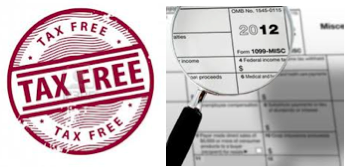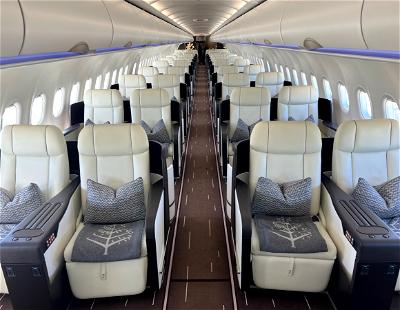Making Travel Less Taxing: Introduction
Your Tax Home (Away from Home)
Airfare and Transportation
Lodging and Meals
Entertaining Clients
Car Expenses
The Nitty Gritty: Required Receipts and Tax Forms
Ask Scott!
Welcome to the third installment of Making Travel Less Taxing; I hope you’re enjoying your weekly tax fix! In weeks one and two of the series, I discussed U.S. tax law for business travel deductions in general. In brief, the key takeaways from those entries are that travel expenses must be ordinary and necessary to your business, unreimbursed and incurred while away from your tax home. This week begins a discussion of specific categories of business travel expenses; airfare and transportation costs and the taxation of frequent flyer miles are first. Please note the legal disclaimer at the end of this post.
Business or Pleasure?
For domestic travel, the cost of your airfare or other transport (train, bus, car) is deductible in full if the primary purpose of your trip was business related even if less than the entire time was spent on business matters. For example, if you travel from Los Angeles to New York for three days of business meetings and then stay two extra days for a short vacation, the entire cost of your airfare would be deductible even though the trip had a personal element. For a trip where the primary purpose is pleasure, only the direct costs you incur to do business while on vacation, such as taking a client to dinner or taking a taxi, would be deductible (we’ll discuss limits on meals and the use of your personal car in greater detail in future weeks).
For travel outside the U.S. (defined for this purpose to be only the 50 states and D.C.; lo siento, Puerto Rico), a trip will be considered entirely for business and all your airfare deductible if it meets at least one of these four tests:
- You have no substantial control over arranging the trip (e.g., you’re not the owner of the business hiring you for the trip);
- You’re outside the U.S. no more than a week (the day you depart does not count, but the return travel day does);
- Less than 25% of your trip was spent on personal matters; or
- Vacation was not a major consideration for the trip.
If you fail all four tests, then you must allocate your airfare expenses according to a fairly complex set of rules that are sure to put you to sleep beyond the scope of this discussion.

Your Travel Companion
If a partner, relative or friend accompanies you on a business trip, you generally cannot deduct his or her expenses unless they are an employee of yours, have a bona fide business reason for the travel and would otherwise be allowed to take the deduction. Considering that there is not even agreement on how to pronounce the word bona fide, it’s no surprise that the substantive meaning of what is a bona fide business purpose is open to interpretation—your tax may vary. The IRS specifically notes that typing notes or accompanying the primary business traveler to dinner is insufficient to establish that your travel partner needed to be there. Presumably, the IRS does not provide a detailed list of what bona fide reasons are because the facts and circumstances of travel vary so widely (or a cynic may speculate that by providing a general standard, rather than a set of rules, the IRS permits itself far more enforcement discretion…but let’s stay positive).
Frequent Flyer Miles
IRS Announcement 2002-18, issued in 2002 (good guess!), is over a decade old but remains the most recent authoritative pronouncement from the Service on the taxation of frequent flyer miles.

Miles are (Effectively) Tax-Free
The IRS acknowledges the difficultly of tracing and valuing miles earned from flights, rental cars and hotels for business travel that are later redeemed for personal use with a policy of non-enforcement: “the IRS will not assert that any taxpayer has understated his federal tax liability by reason of the receipt or personal use of frequent flyer miles or other in-kind promotional benefits attributable to the taxpayer’s business or official travel.” Note that the IRS does not say that miles are tax-free; rather, they say that they will not pursue a taxpayer for failure to report taxable income from the receipt of miles from business travel. No current Internal Revenue Manuals list frequent flyer miles as an audit program of the IRS, either, so we can presume that this policy remains in effect.
The announcement is limited in scope and time: miles or in-kind benefits (upgrades!) from business travel will not create taxable income to the taxpayer at this time, but the IRS could change its mind later. And, importantly, current benefits received that are converted to cash or compensation remain taxable. Under general tax law, all income from whatever source derived is taxable; only those items that are specifically excluded are not taxable. Neither the 2002 announcement nor any other tax law would exclude from taxation amounts received from the conversion of miles or benefits to cash.
In one of the few federal tax cases involving frequent flyer miles, a taxpayer, whose business was horse urine testing, billed his clients for a first class ticket, bought a coach ticket, used his miles to upgrade to first class, and pocketed the excess reimbursement. In that case, the amounts received by the taxpayer from his client that were beyond what he paid for the coach tickets were taxable income to him. Full text here.
Mileage Redemptions are Non-Deductible
If you choose to redeem miles in lieu of paying cash for a business trip, one could argue that whatever the cost of the trip is at the time of booking should be deductible since you effectively substituted one currency (miles) for another (cash). Or, a savvy mileage collector may argue that whatever cost incurred in procuring the miles should be deductible (ice cream fees, anyone?). Alas, as in many other realms, what should be is not what is.
The IRS considers frequent flyer miles earned from flying, renting a car or staying in a hotel to be a partial rebate from the cost of paid business travel, treating such expenses like a non-taxable coupon that reduces the cost of the item you buy. Treating miles like a rebate is tax-favored when they are earned, but when those tax-free miles are redeemed, you have no cost basis to deduct for their use.
For those cash outlays associated with awards, such as close-in booking fees, taxes, fuel surcharges or co-pays for upgrades, your cost for tax purposes is exactly what you paid in cash and would be deductible. But, since the bulk of the cost of an award is typically paid for in miles (unless redeeming for a British Airways coach ticket heavy laden with fuel surcharges), then for tax purposes, you’re leaving quite a bit of value on the table…or are you?
Tax Fantasyland Is Worse than Reality
Let’s briefly sequester ourselves to a land of riches where government coffers are overflowing with bounty. No, not Lucky’s favorite place for tea, but a tax fantasyland where miles and points are taxable when earned. Imagine the revenue that miles earned through office supply and drug stores alone would generate! In addition to the cooling effect it would have on loyalty programs (taxes and award chart devaluations…oh my), whenever you redeemed those previously taxed miles for business travel, you would have a basis in those miles. Then, as long as you could reasonably trace those miles using whatever method the IRS outlined, you could deduct the cost of the miles when redeemed. For personal travel, though, you would still not be able to take a deduction, similar to how you earn a salary, are taxed on it, but are unable deduct all of your personal expenses paid with the proceeds of that salary.

So, this world of whimsy is actually not so lucrative tax-wise. The only “lost” travel deductions under current law occur when miles are redeemed for a business trip; such redemptions do not generate a deduction because the cost basis for the miles earned is zero. Thus, the only taxpayer who would be better off if all miles were taxed when earned is the traveler who redeemed miles only for business travel.
Thus, all other things equal, the optimal plan for tax purposes is to redeem miles for personal trips and pay cash for business trips since no deduction is allowed for mileage redemptions (whether business or personal) while cash paid for business travel is deductible.
A Case for Deducting Purchased Miles
No discussion of tax law is complete without an exception. I would argue that buying miles that are redeemed for business travel should be an exception to the general prohibition against deducting award travel. The IRS likely did not contemplate the purchase of miles for the purpose of redeeming them for business travel when issuing its announcement in 2002; certainly, the practice of purchasing miles was much less common then, if it existed at all.
The best facts for such a deduction would be as follows: you had no previous miles in a program, you purchased miles from the airline (with a bonus attached, naturally), and you redeemed all of the purchased miles for a business trip (Avianca Taca, anyone?). In that case, I think you could successfully argue that the cost of the miles should be deductible since you effectively “purchased” a ticket by buying miles from the airline that then sold you an award seat for business travel. Since you had no previous miles in the program under this hypothetical and redeemed all of them for one business trip, then the tracing and allocation issues that the IRS bemoans in its announcement disappear.
Beyond that best case and somewhat unrealistic hypothetical, the tax waters get muddied quite quickly. Like many of you, I have miles and points in various programs that I have obtained through a variety of shenanigans techniques. Effectively segregating and tracing miles in a manner that would be acceptable to the IRS would be a high hurdle to clear; thus, I would not pursue such a deduction apart from the best case scenario I have outlined (and even then, I would do so with trepidation). Finally, recall that the only lost deduction at issue here is for miles redeemed for business trips.
Summary of tax treatment for earning and redeeming frequent flyer miles:
| Currency | Transaction | Tax Treatment |
| Miles | Earned from business travel for flying, renting a car or staying in a hotel on business | Effectively non-taxable (the IRS will not pursue the collection of tax liabilities generated from earning these miles per Announcement 2002-18) |
| Earned for opening up a bank checking or savings account | No official guidance; taxable if bank considers it a prize or award as Citibank has done | |
| Earned from any other method (personal travel, credit cards) | No official guidance from the IRS, making them effectively non-taxable since no means is given on how to segregate and value miles earned from business and personal travel | |
| Redeemed for business travel | Not deductible, but see argument above for deductibility of purchased miles | |
| Redeemed for personal travel | Not deductible | |
| Cash | Income received for opening up a bank checking or savings account | Taxable; bank will issue Form 1099 for the value of the cash received |
| Expense for taxes, baggage fees, ticketing changes, fuel surcharges and other fees related to frequent flyer redemption for business travel | Deductible | |
| Expense for taxes, baggage fees, ticketing changes, fuel surcharges and other fees related to frequent flyer redemption for personal travel | Not deductible |
Conclusion and Next Time
Hence, your airfare and transportation costs for domestic trips are deductible if the primary purpose of the trip is for business or if you meet certain exceptions for international travel. Frequent flyer miles are not taxable when earned, and consequently, mileage redemptions do not generate tax deductions. Next week, I’ll discuss lodging and meals, outlining per diem rules and the history of the two martini lunch. Please leave any questions you have in the comments! Also, you may follow me on Twitter @ScottTaxLaw or learn more about my legal and CPA practice.
Disclaimer: While I hope the information I provide will be helpful (and hopefully even humorous at times), none of this information should be construed as offering legal advice or creating an attorney-client relationship between the reader and my law firm. You should not act or refrain from acting based on this advice and should consult your own attorney or CPA regarding your specific tax matters. IRS Circular 230 Notice: Nothing in these communication is intended to be used and cannot be used by a taxpayer for the purpose of avoiding penalties that may be imposed by law.





@Shawn -
I'm a little confused by your question. If you sold a car for a gain (which only happens for vintage cars or for cars where bonus depreciation is taken in the first few years of ownership), you would report a gain on the sale. The reason there is no gain on the personal vehicle sale is not because you converted the car to cash; it's because you sold it for less than you...
@Shawn -
I'm a little confused by your question. If you sold a car for a gain (which only happens for vintage cars or for cars where bonus depreciation is taken in the first few years of ownership), you would report a gain on the sale. The reason there is no gain on the personal vehicle sale is not because you converted the car to cash; it's because you sold it for less than you had purchased it.
I don't think the form of the income makes a difference. A lot of taxpayers "barter" with others thinking that if you exchange something other than cash, it's not taxable. Although it would be quite difficult for the IRS to catch bartering transactions, technically, any income or accession to wealth is taxable and it need not be received in cash. If an employer gives an employee a house in exchange for services rendered, such a transfer is not in the form of cash but is still taxable income.
In the same way, the airline separating out the miles would not change the taxation of the benefit received...if miles were taxed (which thankfully they are not).
The idea that miles would be taxable income seems strange. Couldn't the industry simply side-step that issue by claiming that when you purchase a ticket you are actually purchasing the ticket + miles - converting one cash asset into two new equal-value assets in a ticket and points.
When you sell a personal vehicle the sale of the car isn't taxable income, it's just converting the asset you already have (car) into a different asset...
The idea that miles would be taxable income seems strange. Couldn't the industry simply side-step that issue by claiming that when you purchase a ticket you are actually purchasing the ticket + miles - converting one cash asset into two new equal-value assets in a ticket and points.
When you sell a personal vehicle the sale of the car isn't taxable income, it's just converting the asset you already have (car) into a different asset (cash). So long as you don't sell it for a profit of course.
So by the same logic it would seem so long as you aren't "making money" on miles they aren't income.
Matt, yes, I see your point. If you're a contractor, then you'd be able to deduct the cost of the travel directly against your income, but if you're an employee, you'd be subject to the unreimbursed employee business expenses limitation. That limitation requires that expenses exceed 2% of your adjusted gross income before they become deductible and that you itemize deductions.
So, for a taxpayer with an income of $100,000, the first $2,000 in...
Matt, yes, I see your point. If you're a contractor, then you'd be able to deduct the cost of the travel directly against your income, but if you're an employee, you'd be subject to the unreimbursed employee business expenses limitation. That limitation requires that expenses exceed 2% of your adjusted gross income before they become deductible and that you itemize deductions.
So, for a taxpayer with an income of $100,000, the first $2,000 in unreimbursed expenses would not be deductible. Also, a savvy IRS agent may ask this question: what employer requires an employee to go on a trip for business purposes but doesn't reimburse them? For a contractor who gets their own clients, that's an easier answer than for an employee who receives all his work from one employer.
I guess I'm looking at this more from the position of the business not reimbursing for the trip and deducting from business taxes, but an employee or contractor (or business owner, but that's slightly different) just buying the ticket ad deducting it as an unreimbursed business expense. No corporate funds involved.
Matt -
Yes, I understand your point; quite a bit of abuse could be possible for the right situation, which I would see as a wholly-owned business where the owner has discretion over his schedule and finances. If the IRS or Congress saw this as a regularly exploited loophole, then I suppose we'd see this regulation tightened.
In any business that is owned by disinterested parties, the other owners would likely scoff at corporate...
Matt -
Yes, I understand your point; quite a bit of abuse could be possible for the right situation, which I would see as a wholly-owned business where the owner has discretion over his schedule and finances. If the IRS or Congress saw this as a regularly exploited loophole, then I suppose we'd see this regulation tightened.
In any business that is owned by disinterested parties, the other owners would likely scoff at corporate funds being used to the benefit of one person's vacation disguised as a business trip.
@Scott:
Interesting reasoning regarding business loss issues, but that gets more into whether a business can afford to pay for the ticket in the first place. The situation I see is more along the lines of an employee, contractor, or business-owner taking a moment during personal travel to meet with a client or business associate, and suddenly being able to deduct the flight cost from taxes, with nothing out of pocket from the business....
@Scott:
Interesting reasoning regarding business loss issues, but that gets more into whether a business can afford to pay for the ticket in the first place. The situation I see is more along the lines of an employee, contractor, or business-owner taking a moment during personal travel to meet with a client or business associate, and suddenly being able to deduct the flight cost from taxes, with nothing out of pocket from the business. It seems ridiculously loosely written.
I'm not so much thinking of a business spending wildly on inefficient trips, but rather on the seemingly absent protections to prevent various parties from tacking on a business meeting in order to meet the vanishingly low standard to make a trip a "business trip", and then deducting the ticket price from their taxes.
@ThatJohn -
Yes, expenses for taxes, baggage fees, ticketing changes, fuel surcharges and other fees related to frequent flyer redemption for business travel would be deductible. If for personal travel, then none of the expenses are deductible just like when you pay cash for a personal ticket.
I hope your "friend" is going somewhere nice on business.
Scott, what about the cash cost of redemption taxes and fees? Let's say my "friend" had a lot of Virgin Atlantic miles and redeemed them for business purposes, but had to pay $500 in taxes and fees. Would this be deductible?
@Chris B -
Yes, on audit, cash inflows into a bank account would have to be explained to the IRS as to why they aren't taxable.
That's an excellent question on debit card miles earned. I was not aware that those generated a 1099. I know BofA (Alaska) and Suntrust (Delta) are popular mileage earning debit cards. Did either of those issue a 1099 for the miles from everyday spend? I wonder how many cents...
@Chris B -
Yes, on audit, cash inflows into a bank account would have to be explained to the IRS as to why they aren't taxable.
That's an excellent question on debit card miles earned. I was not aware that those generated a 1099. I know BofA (Alaska) and Suntrust (Delta) are popular mileage earning debit cards. Did either of those issue a 1099 for the miles from everyday spend? I wonder how many cents per mile they valued the miles?
I know that initial account bonuses may be taxable (as Citibank did) for bank accounts, because the bank considers them a prize for opening the account. I believe that miles issued for opening a credit card are different because they are considered a rebate for the spending you do on the card (even if there's no minimum spend other than $1).
Officially, no mileage redemptions are deductible. However, if taxes were paid, and you redeemed those miles for a business trip, you may be able to deduct the miles redemption equal to the income you previously realized, but you'd have to explain to the IRS in a way they'd accept how you determined which "set" of miles were redeemed.
Yes, you may be able to deduct expenses incurred in traveling to a volunteer site, but only if there is "no significant element of personal pleasure, recreation or vacation in the travel." Deducting travel costs related to charitable service is quite strict since there's obvious room for some abuse, and of course, you have to itemize deductions to take advantage of charitable contributions. If you want to discuss more, send me a tweet about your specific situation.
Thanks Scott!
So a couple of things I got from this are
- Those who sell their "gift-able" status certificates not only raise the ire of the airline, but may also be committing tax fraud if they don't declare the sale on their taxes :P
- wanted to look up "bona fide" again, since it is a widely used word but wanted to be sure of the definition when related to law.
A...
Thanks Scott!
So a couple of things I got from this are
- Those who sell their "gift-able" status certificates not only raise the ire of the airline, but may also be committing tax fraud if they don't declare the sale on their taxes :P
- wanted to look up "bona fide" again, since it is a widely used word but wanted to be sure of the definition when related to law.
A question in regards to miles: why are miles earned through debit cards taxable (people receive 1099s from the bank), while those on credit cards are not taxable? If taxes are paid, can the ticket mileage expense be deducted?
Third to clarify, if I want to do volunteer work and fly to an organization to conduct the work, can I deduct the airline fee from my personal taxes?
@Matt -
I agree it does seem too generous; I don't make the rules...just try to interpet them. I refer you to IRS Publication 463, page 7.
http://www.irs.gov/pub/irs-pdf/p463.pdf
Perhaps the further thinking is "who has time and cash to undertake such outings?" A business must make a profit 2 out of 5 years to avoid hobby loss rules. So, perhaps the tax policy is that if the business owner is willing to spend business...
@Matt -
I agree it does seem too generous; I don't make the rules...just try to interpet them. I refer you to IRS Publication 463, page 7.
http://www.irs.gov/pub/irs-pdf/p463.pdf
Perhaps the further thinking is "who has time and cash to undertake such outings?" A business must make a profit 2 out of 5 years to avoid hobby loss rules. So, perhaps the tax policy is that if the business owner is willing to spend business funds on international airfare, then owner presumably knows how to best manage the business.
@RestlessLocationSyndrome - yes, that's my reading of the law. The opportunity here is that if you are planning to go somewhere anyway for less than a week, then if you can include some business meetings, the cost of the airfare portion of the trip becomes deductible, which counterintuitively, is more generous than the domestic travel policy. But, note that lodging and other expenses will only be deductible for the days you're doing business, and your...
@RestlessLocationSyndrome - yes, that's my reading of the law. The opportunity here is that if you are planning to go somewhere anyway for less than a week, then if you can include some business meetings, the cost of the airfare portion of the trip becomes deductible, which counterintuitively, is more generous than the domestic travel policy. But, note that lodging and other expenses will only be deductible for the days you're doing business, and your travel companion would be subject to the tests discussed.
I suppose the thinking here is that most business owners would not spend airfare for one business lunch since even if the expense is deductible, that only reduces your cash outlay by your tax rate. For example, assume you spent $1,500 for a ticket to fly to Paris for a business lunch and that you're in the 28% tax bracket. You only *save* for tax purposes 28% of the $1,500 cost.
The 1 week rule seems too lax to be accurate.
@Scott, Thanks for the info especially around the international travel part. If I am reading it correctly, it appears that any trip internationally can be considered a business trip if it is up to 1 week in duration.
So if I leave the US on Sat, March 2nd, travel internationally and have just 1 business lunch, then land back in the US on the following Saturday, March 9th, this would be considered up to...
@Scott, Thanks for the info especially around the international travel part. If I am reading it correctly, it appears that any trip internationally can be considered a business trip if it is up to 1 week in duration.
So if I leave the US on Sat, March 2nd, travel internationally and have just 1 business lunch, then land back in the US on the following Saturday, March 9th, this would be considered up to one week and thus this airfare would be eligible to be considered a business trip. Is this correct?
Thanks, Winston!
Another great post Scott. Thanks!